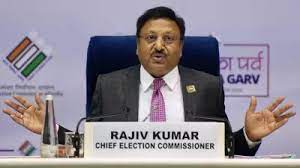From the first Lok Sabha elections in 1952, the number of voters increased by 80 crores by 2024, what has changed in terms of seats in 72 years? and since when

The country’s Chief Election Commissioner Rajiv Kumar has released the complete schedule of Lok Sabha elections 2024. Voting will be conducted in 7 phases in all the states of the country. The first phase will start from April 19. The last phase of voting will take place on June 1. Counting of votes is to be done on June 04. Let us tell you that the first general elections in India were held between October 1951 and March 1952. What has changed in the wake of elections in the 72 years since then? Let us inform you about many interesting information.
It is noteworthy that in the country’s first Lok Sabha elections, voting was held for a total of 489 seats in 401 constituencies. Then the total number of voters was around 17 crore 32 lakh. The first Election Commissioner of India was Sukumar Sen. At that time elections used to be held on ballot paper. But a lot has changed in 72 years. During this period, votes are being cast through electronic voting machines. In the first Lok Sabha elections, a total of 1949 candidates were in the fray for 489 seats in 25 states. The state of Jammu and Kashmir was not included in this voting.
Many important changes took place in 72 years
From the first general elections in 1952 to the Lok Sabha elections in 2024, many important changes have taken place in the country. The biggest change has taken place regarding the age and number of voters. During the first Lok Sabha elections, only people up to the age of 21 years had the right to vote. But now people up to 18 years of age are eligible to vote. Since then, there has been a huge increase of 80 crore voters in the number of voters. According to the Election Commission of India, the total number of voters has reached 97 crore in the year 2024. Whereas during the first election there were only 17 crore voters. Now EVM has replaced the ballot paper.
The country’s first elections were held in 68 phases
Due to complex electoral circumstances and difficult challenges, the country’s first elections had to be conducted in 68 phases. The first vote in India for the 1952 Lok Sabha elections was cast in the year 1951 in Chini tehsil of Himachal Pradesh. Keeping in mind the weather and snowfall, elections were first held here. In other states of the country, general elections for the Lok Sabha of the year 1952 were held in the months of February and March. Now for the last few years, elections are being conducted in 7 phases in all the states of the country.
Congress had registered a one-sided victory
Congress had registered a bumper victory in the country’s first Lok Sabha elections. In this election, Congress had won 364 seats out of 489. Pandit Jawaharlal Nehru then became the first Prime Minister of independent India from the Congress side. A total of 53 parties of the country had contested the first elections. There were also 533 independent candidates in the fray. In this election, independent candidates were second after Congress, who won a total of 37 seats. Whereas CPI won 16 seats and Socialist Party led by Jai Prakash Narayan won 12 seats.
This state had the highest number of Lok Sabha seats
Uttar Pradesh was the largest state in terms of number of seats then and still is. Earlier there were 86 Lok Sabha seats in this state. At present there are 80 Lok Sabha seats. In terms of number of seats then Madras was the state with 75 seats and Bihar with 55 seats.
BR Ambedkar was defeated
The most interesting aspect of this election was that Dr. Bhimrao Ambedkar, the creator of the Constitution who was made the first Law Minister of the country, had lost the first Lok Sabha election of 1952. He was the Scheduled Caste Federation candidate from Bombay (North Central). He was defeated by Congress candidate Narayan Sadoba Kajrolkar by more than 14 thousand votes. Dr. Ambedkar got 1,23,576 votes and Narayan Sadoba got 1,38,137 votes. Later Dr. BR Ambedkar was made a member of Parliament from Rajya Sabha.




